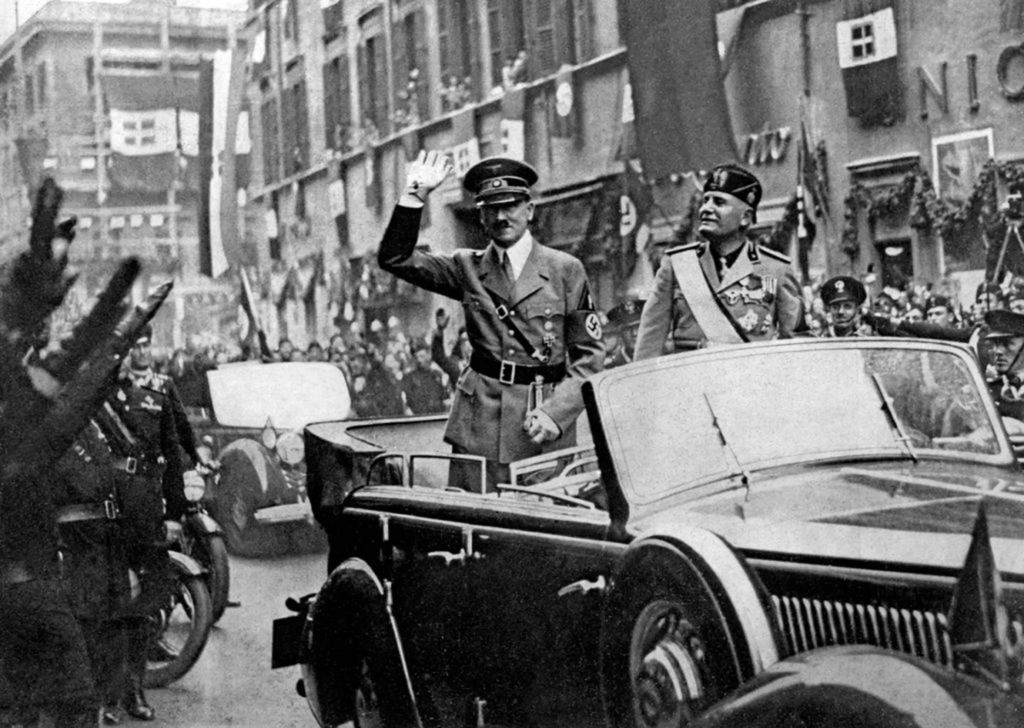Share This Article
In the mosaic of Italian politics, the threads of history weave a complex tapestry, rich with contrasts and controversies. At its heart lies Fascism, a political ideology that once gripped the nation and continues to echo through the corridors of power to this day. Join me as we delve into the intriguing saga of Fascism, exploring its origins, evolution, and its contemporary manifestation in the form of Georgia Meloni(PM of Italy) and her “Brothers of Italy” party.
Fascism is a mass political movement that emphasizes extreme nationalism, militarism, and the supremacy of both the nation and a single, powerful leader over the individual citizen.
Origins of Fascism: A Journey through Time
Fascism emerged in Italy in the tumultuous aftermath of World War I, a time of economic hardship, social upheaval, and political instability. Benito Mussolini, the charismatic leader often hailed as the “Father of Fascism,” capitalized on this climate of discontent, rallying the masses with his vision of a powerful, nationalist state. Central to Fascist ideology was the glorification of the nation, the exaltation of militarism, and the cult of a single, authoritarian leader.
Mussolini’s rise to power was marked by a series of calculated maneuvers, exploiting the grievances of disillusioned Italians who felt betrayed by the failures of liberal democracy. Promising to restore Italy to its former glory, Mussolini presented himself as the strongman the nation needed to navigate the turbulent waters of the post-war era. In 1922, the March on Rome catapulted Mussolini into power, laying the foundation for his Fascist regime.
The Fascist Era: Triumphs and Tragedies
Under Mussolini’s iron grip, Italy witnessed a period of both grandeur and repression. The regime imposed strict censorship, suppressed dissent, and persecuted political opponents. The infamous Roman Salute became a symbol of allegiance to the regime, while Mussolini’s expansionist ambitions led to Italy’s ill-fated foray into World War II. The Fascist era left an indelible mark on Italy’s collective memory, its legacy a subject of perennial debate and reflection.

While Mussolini’s regime initially enjoyed popular support, its descent into totalitarianism and collaboration with Nazi Germany tarnished its image in the eyes of many Italians. The brutality of Fascist rule, coupled with Italy’s disastrous military campaigns, sowed seeds of discontent that would ultimately contribute to Mussolini’s downfall. In 1943, faced with mounting opposition and Allied advances, Mussolini was deposed and Italy capitulated, bringing an end to the Fascist regime.
The Legacy of Fascism: From MSI to the “Brothers of Italy”
In the wake of World War II, Italy grappled with the aftermath of Fascism, confronting its past while navigating the complexities of post-war reconstruction. Out of the ashes of the Fascist regime rose the Movimento Sociale Italiano (MSI), a neo-fascist party that sought to preserve the ideals of Mussolini’s era. The MSI’s clashes with leftist groups during the “Years of Lead” underscored the enduring divide between Italy’s far-left and far-right factions.

The “Years of Lead” were marked by political violence and polarization, as rival factions vied for control of Italy’s future. The MSI, with its roots in Fascism, emerged as a potent force on the far-right, drawing support from disillusioned Italians nostalgic for the certainties of the past. However, the party’s association with the dark days of Mussolini’s regime proved to be a double-edged sword, limiting its appeal to a broader electorate.
Georgia Meloni and the “Brothers of Italy”: A Post-Fascist Narrative
Enter Georgia Meloni, a figure who straddles the line between Italy’s past and present. Raised in the milieu of the MSI, Meloni would later break away to forge her own path, founding the “Brothers of Italy” party in 2012. Characterized as “Post-Fascist” and staunchly anti-immigrant, Meloni’s party has emerged as a potent force in Italian politics, championing a brand of nationalism that resonates with segments of the electorate.
Meloni’s political trajectory reflects the shifting sands of Italian politics, as she seeks to navigate the delicate balance between tradition and modernity. Her unwavering stance on immigration and Islam has won her both admirers and detractors, as she taps into deep-seated anxieties about national identity and cultural change. However, Meloni’s ideological ties to Fascism have raised eyebrows both at home and abroad, prompting questions about the true nature of her political agenda.
Navigating the Present: Challenges and Opportunities
As Italy grapples with the complexities of the modern world, the specter of Fascism looms large, casting a shadow over its political landscape. Meloni’s unabashed admiration for Mussolini and her hardline stance on immigration have sparked controversy and debate, raising questions about the direction of Italian democracy. Yet, amidst the cacophony of competing voices, one thing remains clear: Italy’s journey through the currents of history is far from over.

The rise of the “Brothers of Italy” represents a challenge to Italy’s political establishment, as Meloni seeks to position her party as a viable alternative to the status quo. With Italy facing pressing issues such as economic stagnation, demographic shifts, and social unrest, the stakes have never been higher. Whether Meloni’s brand of nationalism can offer real solutions to these complex problems remains to be seen, but one thing is certain: the legacy of Fascism continues to shape Italy’s political landscape in profound ways.
Conclusion: Reflections on Fascism and the Road Ahead
In the kaleidoscope of Italian politics, Fascism remains a potent force, its echoes reverberating through the corridors of power. As we navigate the twists and turns of history, we must heed the lessons of the past while charting a course towards a more inclusive and democratic future. Whether Fascism serves as a cautionary tale or a rallying cry depends on how we choose to confront the challenges of our time. Let us tread carefully, with eyes open and hearts steadfast, as we journey towards a brighter tomorrow for Italy and beyond.
1 Comment